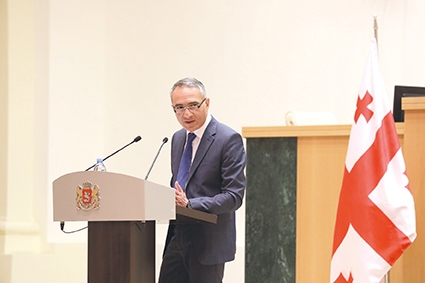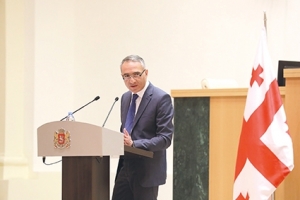Batiashvili’s New Plans for Georgian Education
Mikheil Batiashvili was recently appointed as Georgia’s new Minister of Education, Science, Culture, and Sport. According to Prime Minister Mamuka Bakhtadze, Batiashvili is a “very prominent figure in our professional community” – the two worked together when Bakhtadze was head of Georgian Railways and Batiashvili was rector of the Business and Technology University, which he helped to found. He has spent several years as a member of the Strategic and Competitiveness Institute at the Harvard Business School network, said Bakhtadze, and has significant experience in the field of education and technology.
Batiashvili has faced criticism in the Georgian media and particularly on social media for statements that were seen as overly vague and using doublespeak. His first public remarks came quickly after his appointment, however, and the ministry he now heads is a recent creation, combining the former Ministry of Education and Science with elements of the former Ministry of Sport and Youth Affairs and the former Ministry of Culture and Monument Protection. With several areas of responsibility in his purview, it is not yet clear what Batiashvili’s positions will be on most topics.
Bakhtadze has offered strong support for Batiashvili and his ability to execute government plans for the future of education in Georgia. “We plan to implement a 5-level reform that involves the integration of preschool education, school education, vocational education, higher education and science, the introduction of innovative education systems, and more importantly, the deepening of close ties between education and economics. I am sure Mikheil Batiashvili will be able to implement these very important reforms,” said Bakhtadze.
Batiashvili has made statements on several specific programs, mainly in the field of education. The new minister insists that the government should not only supervise the quality of national education from a distance but be an active supporter and standards-setter. He wants Georgian universities to attract more foreign students by offering programs that are consistent with European standards. “Georgia should transform itself into a regional center of education,” said Batiashvili, “We should offer almost all types of education programs to foreign students, who are important for the country’s foreign image as well as for the state economy.”
Speaking of his reform plans to Parliament, Batiashvili said, “In terms of the authorization-accreditation of universities, we should orient towards European standards. Despite difficulties, a protracted process, and a huge expenditure of energy, our position is that we should satisfy the highest standards. We should not have controlling bodies that frighten universities. We should be oriented on assistance, development and promotion to reach European standards.”
Also speaking to Parliament last week, Batiashvili emphasized the importance of involving Georgian scientists in more international research.
On July 13, Batiashvili spoke out about technology in the classroom, saying “we should not fight smart phones and tablets in schools: we should use them for education.” He plans to focus on “the concept of digital school,” which would encourage classrooms to integrate electronic devices and technology into the curriculum and utilize diverse resources, including videos and computer programs.
Batiashvili has long promoted STEM (science, technology, engineering, and math) development in Georgia. One of his landmark projects as rector of Tbilisi’s Business and Technology University was ‘Silicon Valley,’ a public research, business and development center near Turtle Lake. “The mission of Silicon Valley Tbilisi is to become a regional educational hub that will meet the educational needs to be competitive in the global market. Our objective is to train highly qualified professionals and to give them a chance to be hired by leading international companies, without leaving Georgia,” said Batiashvili in September 2016, ahead of the center’s opening.
The new Ministry of Education also plans to change the funding mechanisms for students. The new structure “will not be attached to the current system. It will be based on a different system consisting of various criteria. World Bank experts are involved in this reform. We’ll introduce it in September,” Batiashvili said yesterday at an extraordinary session of Parliament.
By Samantha Guthrie











